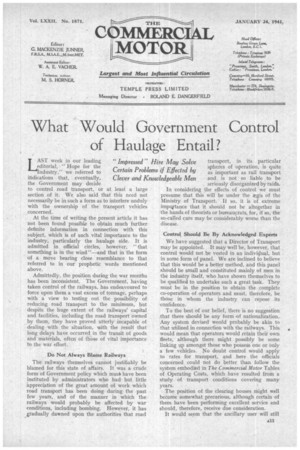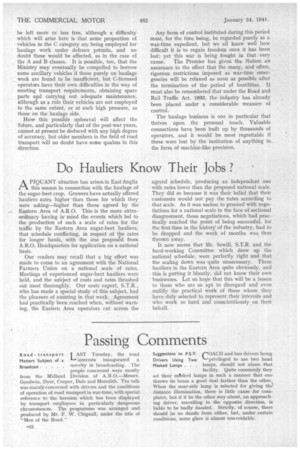What Would Government Control of Haulage Entail?
Page 13

Page 14

If you've noticed an error in this article please click here to report it so we can fix it.
LiAST week in our leading editorial, " Hope for the ndustry," we referred to indications that, eventually, the Government may decide to control road transport, or at least a large section of it. We also said that this need not necessarily be in such a form as to interfere unduly with the ownership of the transport vehicles concerned.
At the time of writing the present article it has not been found possible to obtain much further definite information in connection with this subject, which is of such vital importance to the industry, particularly the haulage side. It is admitted in official circles, however, "that something is in the wind "—and that in the form of a move bearing close resemblance to that referred to in our prophetic words mentioned above.
Admittedly, the position during the war months has been inconsistent. The Government, having taken control of the railways, has endeavoured to force upon them a vast excess of tonnage, perhaps with a view to testing out the possibility of reducing road transport to the minimum, but despite the huge extent of the railways' capital and facilities, including the road transport owned by them, they have proved utterly incapable of dealing with the situation, with the result that long delays have occurred in the transit of goods and materials, often of those of vital importance to the war effort.
Do Not Always Blame Railways The railways themselves cannot justifiably be blamed for this state of affairs. It was a crude form of Government policy which must, have been instituted by administrators who had but little appreciation of the great amount of work which road transport has been doing during the past few years, and of the manner in which the railways would probably be affected by war conditions, including bombing. However, it has gradually dawned upon the authorities that road transport, in its particular spheres of operation, is quite as important as rail transport and is not so liable to be seriously disorganized by raids.
In considering the effects of control we must presume that this will be under the agis of the Ministry of Transport. If so, it is of extreme impqrtance that it should not be altogether in the hands of theorists or bureaucrats, for, if so, the so-called cure may be considerably worse than the (1 isease.
Control Should Be By Acknowledged Experts We have suggested that a Director of Transport may be appointed. It may well be, however, that control would not be vested in an individual, but in some form of panel. We are inclined to believe that this would be a better method, and this panel should be small and constituted mainly of men in the industry itself, who have shown themselves to be qualified to undertake such a great task. They must be in the position to obtain the complete co-operation of operators and must, therefore, be those in whom the industry can repose its confidence.
To the best of our belief, there is no suggestion that there should be any form -of nationalization. Any system devised would probably be akin to that utilized in connection with the railways. This would mean that operators would retain their own fleets, although there might possibly be some linking up amongst those who possess one or only a few vehicles. No doubt control would apply to rates for transport, and here the officials concerned could not do better than follow the system embodied in The Commercial Motor Tables of Operating Costs, which have resulted from a study of transport conditions covering many years.
The position of the clearing houses might well become somewhat precarious, although certain of them have been performing excellent service and should, therefore, receive due consideration.
It would se,em that the ancillary user will still All be left more or less free, although a difficulty which will arise here is that some proportion of • vehicles in the C category are being employed for haulage work under defence permits, and no doubt these would be affected, as in the case of the A and B classes. It is possible, too, that the Ministry may eventually be compelled to borrow some ancillary vehicles if those purely on haulage work are found to be insufficient, but C-licensed operators have their own difficulties in the way of meeting transport requirements, obtaining spare parts acid carrying out adequate maintenance, although as a rule their vehicles are not employed to the same extent, or at such high pressure, as those on the haulage side.
How this possible upheaval will affect the future, and particularly that of the post-war years, cannot at present be deduced with any high degree of accuracy, but older members in the field of road transport will no doubt have some qualms in this 'direction. Any form of control instituted during this period must, for the time being, be regarded purely as a war-time expedient, but we all know well how difficult it is to regain freedom once it has been lost; yet this war is being fought in that very cause. The Premier has given the Nation an assurance to the effect that the many, and often, rigorous restrictions imposed as war-time emergencies will be relaxed as soon as possible after the termination of the period of hostilities. It must also be remembered that under the Road and Rail Traffic Act, 1933, the industry has already been placed under a considerable measure of control.
The haulage business is one in particular that thrives upon the personal touch. Valuable connections have been built up by thousands of operators, and it would be most regrettable if these were lost by the institution of anything in_ the form of machine-like precision.




















































